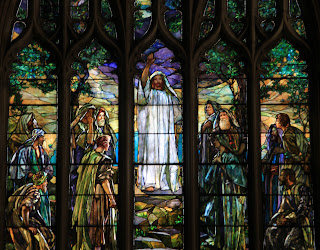Entrusted
Homily delivered Seventh Sunday of Pentecost (Proper 9; Year C RCL)
7 July 2013; 8:00 a.m. Said, 10:00 Sung Eucharist with Holy Baptism
Parish Church of Trinity Ashland, Oregon
God,
take away our hearts of stone
and give us hearts of flesh. Amen.
Elena and I had the great pleasure of watching
Ashland’s Fourth of July Parade on Thursday, seated with friends from the parish. It was the first time for us. I can tell you, we were impressed! Ashland definitely puts on one of America’s
best small town parades.
The crowd laughed and clapped, and
occasionally sang or danced along with the various groups and their messages—whether
Latino pride, ban GMOs and disband Monsanto, support the troops, reduce fuel
costs, end corporate legal personhood, GLBT pride, reduce use of fossil fuels,
or simply love art and music.
I was a bit puzzled when we saw those who
had won the first prize for a “Religious Group”: a small rag-tag group of pagans or atheists
whose slogan, hastily scrawled on the banner they carried, was something like
“NO RULES FROM ABOVE.” “O.K.,” I thought
to myself, “Maybe this is just Ashlandia
in all its glory.” But the reason for
the win became clear a few minutes later when the only competition in the
category passed by.
A grim group of Evangelicals of some
sort marched by with carefully lettered banners proclaiming “ANGRY JESUS IS
COMING SOON. BELIEVE AND REPENT, OR BURN
IN HELL.”
The laughing and clapping crowd fell
silent and watched sullenly as this group passed. Someone nearby said, “Well isn’t THAT a great
way to kill a buzz!” But then the
highland pipers marched past with their wail of joyful noise, and the crowd
sprang back to life.
“What could they be thinking?” I thought. “How do they think insulting everyone will attract
anyone?” No wonder the pagans won hands
down!
The fact is, the grim ones probably saw
validation in the crowd’s rejection. “True
believers must be rejected, persecuted for their faith.” It’s right there in today’s Gospel: “I send
you out as lambs among wolves. Those who
reject you reject me, and come judgment day, it’ll be worse for them than for
Sodom and Gomorrah!” And so people who
think this way tend to intentionally make
others reject them and hate them, just as some sick people quote later verses here
as they pick up rattlesnakes so God can prove
he loves them.
But Jesus taught “You shall know a tree
by its fruits. A good tree cannot bring
forth bitter fruits, and a bad tree sweet ones” (Matt. 7:17; Luke 6:43). Jesus’ proclamation of God’s Reign was good news, not bad.
Today’s Gospel tells the origins of Christian
ministry. Luke is the only Gospel that tells
about Jesus calling and sending forth 70 apostles in addition to the Twelve. Where the Twelve represent the recreation of
Israel as a people with its ancient tribes; the Seventy stand for those in Israel
who enjoy the spirit of communication with God.
Remember that when Moses received the Law, he was commanded to have
“seventy of the elders of Israel” accompany him (Exodus 24:1-9; Numbers
11:16-30), where Moses says, “Oh that all the Lord’s people might be prophets!”
John Dominic Crossan rightly observes
that the stories of Jesus sending the twelve and the seventy represent a
significant organizational strategy on the part of the historical Jesus. A single decapitating sword-stroke by one of
Herod’s henchmen had effectively ended John the Baptist’s movement. By sending out many people with his good news all around, Jesus decentralized his
movement. The rulers would thus have a
much harder time of killing it by simply killing its leader. By the time Jesus was crucified, hundreds of
such ministers were spread throughout Judea and Galilee. When stories of his death and the events
following finally reached them, their experience of Jesus, both before and
after his death, led them to say, like the Seventy in today’s reading, “The
blind see, the lame walk, the spirit is with us… Christ is alive!”
Despite almost continual efforts to impose order, hierarchy,
and unity, from the beginning Christ’s followers have remained a diverse lot, driven by the
investment that comes from having made the faith their own. Fractious and tending to break into sects
(usually along cultural or linguistic lines), different Christians have nevertheless
seen themselves as the true expression of Christ’s teaching.
We have tried to resist this centrifugal force, this tendency toward sectarianism, by grounding our
faith in the scripture and writings of the apostolic age. We found that such a canon—the Bible—is diverse
and culturally and historically conditioned enough that it isn’t really
sufficient to serve as a sole guide to the faith. We tried to center our belief in the tradition
of the bishops who succeeded the apostles in their oversight of the local
churches, and to be universal in our
faith. But bishops disagreed with each
other.
We sought a faith that we could all agree on. That’s what the great early Councils of the
Church were about. A faith comprehensive
both in time and space, throughout the eras and transcending localities—this is
what the Greek word katholikos,
means: according to the whole kat –
holicos. That’s why when we recite
the Creed from these Councils to this day, we talk of believing one, holy, catholic, and apostolic Church.
But we have been only partly successful in achieving truly
comprehensive faith, that which was, according to St. Vincent of Lerins, commonly
believed by the faithful of all times and all places. So we use our reason to try to make it
cohere. Thus the tripod of our
faith: scripture, tradition, and reason
informed by data and experience. And
still we tend toward sect.
Given the schisms, divisions, and accusations of heresy that
have always been a part of the big, baggy, and chaotic thing that historically
is called Christianity, we might say
that, Jesus in sending out missioners two by two into diverse settings, had anticipated
a key idea of modern organizational behavior theory: lose control in order to gain influence. He guaranteed the Church’s survival by
entrusting it to believers, thus building into it the centrifugal force and ensuring its diversity.
Jesus counsels those he sends to proclaim the Good
News. And we are all sent to proclaim the Good News. Today we are celebrating the baptism of
little Henry James Rutledge Tufts. Jesus
speaks to us in the baptismal covenant that we have all taken: be faithful to the apostles’ teaching and
fellowship, in the breaking of the bread, and in the prayers; whenever you fall
into sin repent and return to me; proclaim by word and example my Good News of
God; seek and serve me in all persons; work for justice and peace and treat
every person with dignity.
This is not a call to grimly use speech to beat up on other people like that
sorry group in the parade. St. Francis
said that we should preach the Good News at all times and in all places, and
only very occasionally, when it is really necessary, to open our mouths to do
so.
Jesus’ counsel to those he sent is counsel to us, a guide to
the spiritual life necessary to keep us faithful to him, despite our
differences.
“Go two by two”
that is, don’t trust your own individual
belief and internal guidance, but always work and serve in larger community. Use the self-correction that comes from being
part of a larger team of believers.
Thomas Merton famously said that the most dangerous and spiritually
deadly person is the mystic who lives in isolation, without the spiritual
direction and guidance of another. Since
you are going into a dangerous world, lambs among wolves, Jesus implies, know
you will be discouraged and lose faith at times, and need your comrades in
faith to get you through the rough spots.
And then when they are in
rough spots, it will your turn to get
them through. We need each
other. That is why we baptize
enfants—this calling in not a calling to individual monads, but to people in
families, in communities. “Go two by two.”
“Carry no money bag, no sack, no
sandals. Stay with whoever will give you
a place to stay, and together with them, eat and drink whatever they put in
front of you.” Serving Jesus and proclaiming joyful news is not
about self-sufficiency and independence.
It is about interdependence, relying on each other. So simplify your tastes and standards. Don’t depart on this journey with everything
prepared just so in extensive luggage, with your favorite foods and small
comforts. You may just have to eat
non-gourmet, or non-vegan, or even barely edible, stuff if that is what those
you serve have to offer. This is about
sharing and accepting things shared with you, not about meeting your standards
or demands. Simplicity is the mother of
humility. Humility is the mother of listening. And listening is the mother of community.
We have
medical needs, to be sure, but even here we must remember the spiritual
principle of opening ourselves to dependence and being served. It may mean
learning new ways of eating, drinking, communicating, and, yes, even
worshiping, even when we are old. I
thank God that one of my mentors told me as I preparing for ordination that if
at all possible, I had to simply love the people served, and with them their
dogs and cats, no matter how allergic I was to them. Love Jesus, love his people. Love his people, love their dogs. “Take no money bag or sack, and eat what they
put in front of you.”
“Don’t go from house to house, but stay
where you are received. Cure their
illness, declare the joy of God’s reign there, and let your peace rest with
them.” Grow where you are planted. You are no longer a
religious consumer, wandering from one potential friend in the faith to
another. You should no more pick and
chose whom you will grace with relationship than you should pick and choose
what is put on the plate before you. “Stay
where you are received.”
This openness
and vulnerability to community of the individual sent ones must also grow in
their larger communities. They must be
open and willing to listen as well.
But even
open-hearted sent ones might not be received with openness. Jesus here tells us
here how to respond to rejection of us and the joyful news: don’t dispute, curse, or worry. Just move on quickly, and go to meet the
others who surely will receive you with joy.
Go on your way and don’t look back.
In all of
these sayings, Jesus is calling us, too, to follow his example. He wants us to lose control to gain
influence. In our labor in God’s
harvest, we need to follow his guidance here.
Be open hearted, open minded, and open handed, willing to accept who and
what God sends us. And in that, he is
calling us to the true unity of his followers and the true loving service of
all his children.
In the name of God, Amen.























